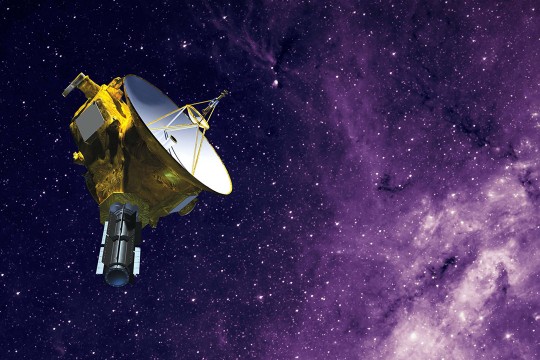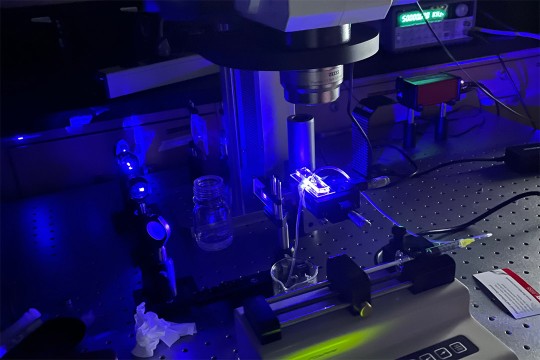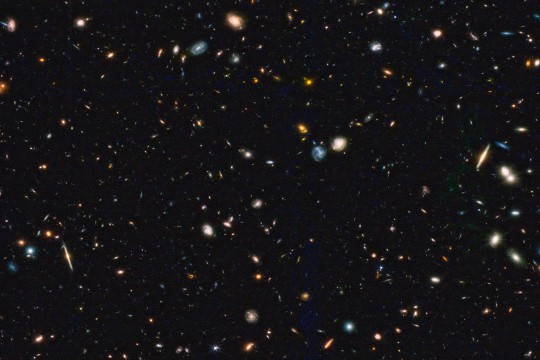News
School of Physics and Astronomy
-
January 27, 2023
![Artistic representation of an orange neutron star spitting material into a spinning vortex.]()
RIT scientists reach a milestone in the search for continuous gravitational waves
Scientists on the hunt for a previously undetected type of gravitational waves believe they are getting close and have refined techniques to use in upcoming observational runs. Researchers from the LIGO-Virgo-KAGRA Collaboration outlined the most sensitive search to date for continuous gravitational waves from a promising source in a paper recently published in the Astrophysical Journal Letters.
-
January 9, 2023
![four images of space with 13 insets showing greater detail of celestial elements.]()
James Webb Space Telescope study reveals wide diversity of galaxies in the early universe
New data from the James Webb Space Telescope (JWST) have revealed that the structures of galaxies in the early universe were much more diverse and mature than previously known. RIT Associate Professor Jeyhan Kartaltepe said that JWST’s ability to see faint high redshift galaxies in sharper detail than Hubble allowed the team of researchers to resolve more features and see a wide mix of galaxies.
-
December 16, 2022
![Artist's impression of NASA's New Horizons spacecraft.]()
New study confirms the light from outside our galaxy brighter than expected
In a study led by RIT researchers, scientists analyzed new measurements showing that the light emitted by stars outside our galaxy is two to three times brighter than the light from known populations of galaxies, challenging assumptions about the number and environment of stars are in the universe.
-
November 22, 2022
![Various components and wiring of the detectors used for project]()
RIT astrophysicists leverage cancer center to damage single-photon CMOS detectors for future space missions
A recent trip to a cancer center in Boston helped astrophysicists from RIT's Center for Detectors reach a key milestone in their mission to develop advanced CMOS image sensors for future NASA space missions.
-
October 3, 2022
![microscope equipment.]()
RIT to launch new physics Ph.D. program in fall 2024
RIT will begin offering a new Ph.D. in the fall of 2024 that is designed to prepare graduates to extend the frontiers of fundamental scientific knowledge and develop new advances in technologies at the forefronts of 21st century physics.
-
August 29, 2022
![side-by-side images of the Jewel Bug Nebula, with the left showing purples and blues and the right showing reds, blues, and greens.]()
RIT scientists to study molecular makeup of planetary nebulae using radio telescopes
By using radio telescopes to study sun-like stars in their death throes, scientists hope to reveal important information about the origin of life-enabling chemicals in the universe. The NSF is awarding a $339,362 grant to a team led by Professor Joel Kastner to conduct such a study.
-
August 5, 2022
![Student and professor in lab, looking at computer screen]()
RIT student Lazar Buntic awarded NASA FINESST graduate student fellowship
RIT student Lazar Buntic received a earned a graduate research fellowship through the Future Investigators in NASA Earth and Space Science and Technology program to develop infrared detectors for next generation telescopes.
-
August 4, 2022
![image from a space telescope showing specks and blobs of differing sizes and colors.]()
RIT astrophysicists collaborate on JWST survey yielding wide view of the early universe
New images from NASA’s James Webb Space Telescope show what may be among the earliest galaxies ever observed. The images were taken from the Cosmic Evolution Early Release Science Survey (CEERS), led by a scientist at The University of Texas at Austin. Jeyhan Kartaltepe, an associate professor from RIT, is one of 18 co-investigators from 12 institutions along with more than 100 collaborators from the U.S. and nine other countries.
-
June 28, 2022
![two women talking in a dean's office.]()
College of Science Dean Sophia Maggelakis to become provost of Wentworth Institute of Technology
Dean Sophia Maggelakis will be leaving RIT to become the senior vice president for academic affairs and provost at Wentworth Institute of Technology. Maggelakis joined RIT as an assistant professor in 1990, became head of the School of Mathematical Sciences in 2001, and became dean of the College of Science in 2010.
-
June 6, 2022
![an artist's impression of the view from a planet that may have formed in the disk of gas and dust orbiting a star.]()
RIT professor earns NASA grant to study baby stars and newborn planets closest to Earth
A team of RIT scientists is poring over NASA data for new insights about Earth’s youngest, closest neighbors. Joel Kastner, a professor in RIT’s Chester F. Carlson Center for Imaging Science and School of Physics and Astronomy, received nearly $400,000 for a NASA archival study to advance our understanding of newly formed stars and planets.
-
May 23, 2022
![portrait of student Olivia Young.]()
RIT student Olivia Young receives prestigious NSF Graduate Research Fellowship
Astrophysical sciences and technology Ph.D. student Olivia Young earned a competitive fellowship from the National Science Foundation to develop machine learning algorithms that will help scientists use radio telescopes to study transient objects such as pulsars and fast radio bursts.
-
May 16, 2022
![portrait of professor Ben Zwickl.]()
Ben Zwickl to spend fall in Oslo studying physics students’ computational literacy and career interests
Associate Professor Ben Zwickl will head to the University of Oslo this fall to research what he calls one of the most understudied aspects of the undergraduate physics curriculum.
















